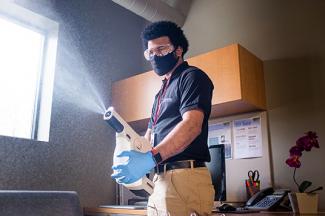Why do we get sick during the winter months?
For many, colder weather is the start of everyone getting sick. "The stomach bug the kids caught from school” and “the cold passing around the office” are a near annual occurrence. No matter where you are or what industry you’re in, it seems inevitable. And it isn’t just you: data shows that the peak months of the flu season are December, January, and February. The common cold, stomach bug, and other illnesses see a similar trend.
Many will blame the cold air for increased sickness. The truth is surprisingly more complex.

Indoor Environments
The spread of most illnesses is not through the cold air outdoors. Rather, it’s indoors!
The first thing that most people do when it gets cold is head indoors. Outdoor activities dwindle down, outdoor equipment is packed away, and most events become indoors only. Immediately, this means that more people are staying indoors for longer periods of time. This more often than not means more people in small spaces for longer periods of time. As such, viruses have an easier time spreading from person to person.
Ventilation also plays a huge role with indoor environments. HVAC systems often provide most of the ventilation to buildings, exchanging and filtering indoor air. However, in warmer weather opening doors and windows can help alleviate some of that burden. In winter, when the indoor population is high and doors and windows are shut tight, ventilation is bound to suffer. Even the best HVAC systems can struggle with such conditions.
There are also high-touch surfaces to consider. With more people indoors, more people are touching surfaces. If a biocontaminant ends up on one of these high-touch surfaces, it can potentially infect everyone who touches it afterwards.
Humidity
Low humidity during the winter months can have a great impact on spreading illness. Cold air cannot retain a lot of moisture, making outdoor air drier during the winter. For indoor air, low humidity is often caused by our heaters heating and therefore drying the air.
There are several different possible reasons for why this is the case. Some studies hypothesize that virus particles have an easier time replicating in drier environments. Others hypothesize that the lack of moisture allows the particles to float in the air longer. Another prevalent idea involves dry skin; skin tends to dry and crack in low humidity, including in your nasal passage, which may provide another way for virus particles to get into your body and make you ill. There are more hypotheses than the ones mentioned. What they all seemingly agree on, however, is that low humidity means a higher spreading of viruses.
Keep in mind, the opposite situation isn’t the answer. High humidity can increase the growth of mold and mildew, which can be just as harmful to your health.
Travel and Holidays
Another factor that plays a huge role in spreading illness during the colder months is travel. With our abilities to get from one side of the country to another in less than a day, travel destinations and conditions play a huge role in our health.
First of all, we can quite literally bring illness from one place to another. A fun trip can end up bringing seasonal sickness from our vacation destination into our homes. The opposite can happen as well: we can bring illness from our homes into the travel destination. And as with any illness, they can continue to spread within the community once they take hold.
Travel conditions also play a huge role. Most of our travel plans involve some sort of communal transportation: buses, trains, planes, and even ride shares. These are all small spaces shared with a lot of people. This multiplies the issues mentioned earlier, with small spaces of high population density and limited ventilation.
One unfortunate coincidence is that there are a lot of holidays during the colder months. Many of these holidays are spent with family and loved ones. If one is not careful, illness can play a role during some of the happiest times of the year.
Cold Air
There are some instances where cold air can be directly linked to illness. However, most of them are rather specific instances.
People with asthma or chronic obstructive pulmonary disease (COPD) can get sick from cold air alone. Cold air can trigger inflammation in the lungs and airways. This, in turn, can trigger other symptoms that can make it harder to breathe. You can imagine how easily someone can get sick in those conditions.
People with eczema will also see more flare ups during the colder months. The cause is due to humidity; drier air means drier skin, which can easily become irritated and itchy.
There are other instances of cold air directly linked to illness, like hypothermia. But despite its reputation, more often than not cold air is not a direct cause of illness.
Prevention
As with any spreading illness, there are steps that can be taken to reduce and even eliminate illness.
- Encourage hand washing and using personal protective equipment. This can play a huge role in reducing illness.
- When possible, space out the distance between yourself and other people. With many viruses having airborne potential, from the annual flu to COVID-19, increasing space between people can reduce the spread.
- Consider getting an air purifier with a HEPA-grade filter. A high-quality air purifier can reduce ventilation issues. Our choice is AIRBOX.
- Use a humidifier. Adding moisture in the air can help reduce potential issues and symptoms.
- Have a plan in place in case sickness in a community increases. From working at home plans to rotating schedules, preparation can prevent chaos and losing time and money in the long run.
- Review the cleaning routine of your office and speak with the cleaning staff.
- Be honest about your health and take days off if you are feeling unwell. Going into work sick is often unproductive, exposes other people, and will make it take longer for you to recover.
Get the Experts of Cleaning
Janitronics has always cleaned for health. Get the experts of cleaning on your side to prepare for the winter months. Reach out to us here.



